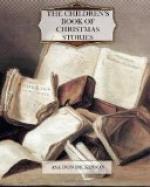“Wait ye, whoever ye are!” and Teig was away to the corner, digging fast at the loose clay, as a terrier digs at a bone. He filled his hands full of the shining gold, then hurried to the door, unbarring it.
The miller’s wee Cassie stood there, peering at him out of the darkness.
“Take those to the widow O’Donnelly, do ye hear? And take the rest to the store. Ye tell Jamie to bring up all that he has that is eatable an’ dhrinkable; and to the neighbours ye say, ‘Teig’s keepin’ the feast this night.’ Hurry now!”
Teig stopped a moment on the threshold until the tramp of her feet had died away; then he made a hollow of his two hands and called across the road:
“Hey there, Barney, will ye come over for a sup?”
X. A STORY OF THE CHRIST-CHILD*
Reprinted by permission of the author from her collection, “Christmastide,” published by the Chicago Kindergarten College.
A German legend for Christmas Eve as told by
ELIZABETH HARKISON
Once upon a time, a long, long time ago, on the night before Christmas, a little child was wandering all alone through the streets of a great city. There were many people on the street, fathers and mothers, sisters and brothers, uncles and aunts, and even gray-haired grandfathers and grandmothers, all of whom were hurrying home with bundles of presents for each other and for their little ones. Fine carriages rolled by, express wagons rattled past, even old carts were pressed into service, and all things seemed in a hurry and glad with expectation of the coming Christmas morning.
From some of the windows bright lights were already beginning to stream until it was almost as bright as day. But the little child seemed to have no home, and wandered about listlessly from street to street. No one took any notice of him except perhaps Jack Frost, who bit his bare toes and made the ends of his fingers tingle. The north wind, too, seemed to notice the child, for it blew against him and pierced his ragged garments through and through, causing him to shiver with cold. Home after home he passed, looking with longing eyes through the windows, in upon the glad, happy children, most of whom were helping to trim the Christmas trees for the coming morrow.
“Surely,” said the child to himself, “where there is so must gladness and happiness, some of it may be for me.” So with timid steps he approached a large and handsome house. Through the windows, he could see a tall and stately Christmas tree already lighted. Many presents hung upon it. Its green boughs were trimmed with gold and silver ornaments. Slowly he climbed up the broad steps and gently rapped at the door. It was opened by a large man-servant. He had a kindly face, although his voice was deep and gruff. He looked at the little child for a moment, then sadly shook




